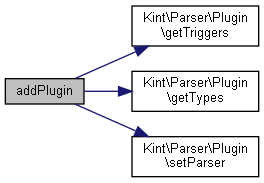◆ __construct()
| __construct |
( |
|
$depth_limit = false, |
|
|
|
$caller = null |
|
) |
| |
- Parameters
-
| false | int | $depth_limit | Maximum depth to parse data |
| null | string | $caller | Caller class name |
◆ addPlugin()
◆ childHasPath()
◆ clearPlugins()
◆ getCallerClass()
◆ getCleanArray()
| getCleanArray |
( |
array |
$array | ) |
|
Returns an array without the recursion marker in it.
DO NOT pass an array that has had it's marker removed back into the parser, it will result in an extra recursion
- Parameters
-
| array | $array | Array potentially containing a recursion marker |
- Returns
- array Array with recursion marker removed
◆ getDepthLimit()
◆ haltParse()
◆ noRecurseCall()
◆ parse()
Parses a variable into a Kint object structure.
- Parameters
-
| mixed | $var | The input variable |
| BasicObject | $o | The base object |
- Returns
- BasicObject
◆ parseDeep()
Disables the depth limit and parses a variable.
This should not be used unless you know what you're doing!
- Parameters
-
| mixed | $var | The input variable |
| BasicObject | $o | The base object |
- Returns
- BasicObject
◆ setCallerClass()
| setCallerClass |
( |
|
$caller = null | ) |
|
Set the caller class.
- Parameters
-
| null | string | $caller | Caller class name |
◆ setDepthLimit()
| setDepthLimit |
( |
|
$depth_limit = false | ) |
|
Set the depth limit.
- Parameters
-
| false | int | $depth_limit | Maximum depth to parse data |
◆ $caller_class
◆ $depth_limit
◆ $marker
◆ $object_hashes
◆ $parse_break
◆ $plugins
◆ TRIGGER_BEGIN
◆ TRIGGER_COMPLETE
| const TRIGGER_COMPLETE = 14 |
◆ TRIGGER_DEPTH_LIMIT
| const TRIGGER_DEPTH_LIMIT = 8 |
◆ TRIGGER_NONE
Plugin triggers.
These are constants indicating trigger points for plugins
BEGIN: Before normal parsing SUCCESS: After successful parsing RECURSION: After parsing cancelled by recursion DEPTH_LIMIT: After parsing cancelled by depth limit COMPLETE: SUCCESS | RECURSION | DEPTH_LIMIT
While a plugin's getTriggers may return any of these
◆ TRIGGER_RECURSION
| const TRIGGER_RECURSION = 4 |
◆ TRIGGER_SUCCESS
| const TRIGGER_SUCCESS = 2 |
The documentation for this class was generated from the following file:
- C:/xoops2511b2/htdocs/class/libraries/vendor/kint-php/kint/src/Parser/Parser.php







